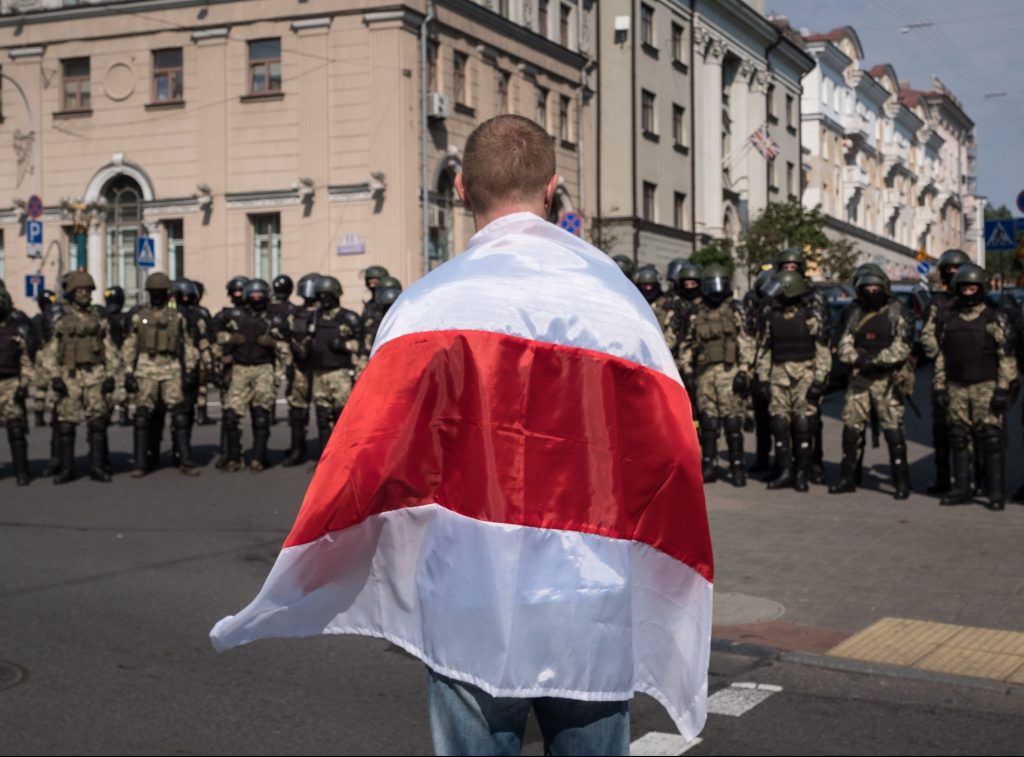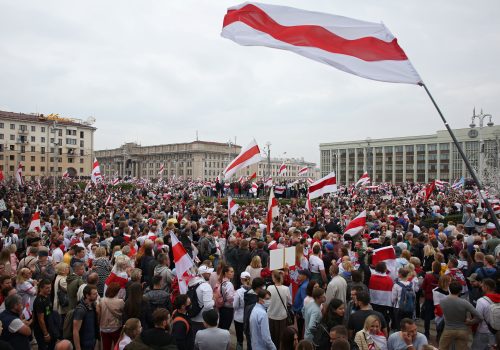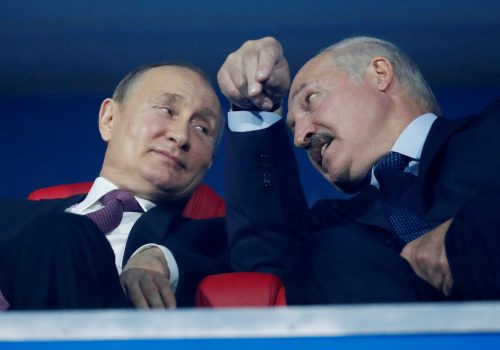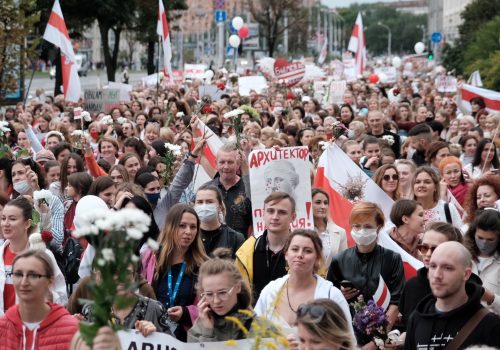Almost one month since the outbreak of an unprecedented pro-democracy uprising in Belarus, the situation in this geopolitically important East European country remains highly volatile and finely poised. Protests first erupted in the immediate aftermath of the August 9 Belarusian presidential election, which was marred by widespread accusations of fraud. While the protests appear to enjoy overwhelming public support, the movement lacks the kind of leadership that might otherwise have enabled it to achieve a decisive political breakthrough.
Belarusian President Alyaksandr Lukashenka has suffered a catastrophic loss of legitimacy in recent weeks, but he continues to enjoy strong backing from his country’s security services and from neighboring Russia. The Kremlin was initially hesitant in its response to the Belarus uprising, but Vladimir Putin has since declared his readiness to send Russian forces across the border if necessary in order to restore order and prop up the Lukashenka regime. Moscow has also intervened in the crisis by sending teams of media experts to take over the running of Belarus state TV and manage Lukashenka’s information strategy.
With no obvious room for compromise and Russia’s vast resources of repression now seemingly available to the beleaguered Belarusian dictator, many fear the country is about to experience a comprehensive and prolonged crackdown. However, with the current Belarusian government’s credibility in tatters and opposition sentiment at record highs, it is difficult to imagine a return to the authoritarian status quo in a country that had until recently been primarily known as Europe’s last dictatorship.
As events in Belarus continue to unfold, the Atlantic Council invited a series of experts to share their views on the various different factors that are likely prove decisive in determining the outcome of the crisis during the days and weeks ahead.
John Herbst, Director, Eurasia Center, Atlantic Council: Belarus is at an impasse. The unexpected civil disorder prompted by President Lukashenka’s transparent effort to steal the election persists despite a nasty but insufficient effort to quell it violently. The massing of security forces, the shutdown of the internet, the clampdown on Western media presence, and Kremlin statements of readiness to help restore order did not prevent over 100,000 protesters from turning out in Minsk on Sunday, along with large demonstrations in other cities. There were reportedly over 100 arrests, but no major violence. Lukashenko is now massing the force to crack down hard on protesters, and is trying to create a controlled information environment to minimize international reaction. But he seems reluctant to do so. Perhaps he is not confident that it will succeed; and perhaps Moscow is worried that it, too, would face blame and sanctions for a crackdown. At the same time, Moscow appears to be avoiding any contact at all with the Belarusian opposition. Putin may not like Lukashenka, but he seems to be doubling down in his support.
There are no major opposition leaders at large in Belarus for the authorities to arrest. The internet can be throttled, but messaging app Telegram still works. Barring a massive use of force, or Lukashenka making a major concession (for instance, by agreeing to new elections), the demonstrations will continue. So the short term prognosis is for more of the same. Neither the regime nor the protesters at this time have reason to change course. The Western and especially the American response to the repression thus far has been slow and weak. An imposition of sanctions on senior Belarusian officials involved in the crackdown, on Russian media experts running Belarusian TV, and a plausible threat of sanctions on Russia to deter it from sending security forces, could have an outsized impact in helping the opposition to nullify a fraudulent election.
Carl Gershman, President, National Endowment for Democracy: In the three weeks since the August 9 presidential election, the crisis in Belarus has reached a stand-off that could last for months. There are three key factors that will influence the outcome: Russian intervention, European and other outside pressure, and the internal forces at play within Belarus itself. Russia has already deployed both soft and hard power. After Belarusian media workers walked out of their jobs at state television, Russian “journalists” were sent in to staff the state broadcasting apparatus. Disinformation has now been supplemented by a special Russian reserve force that Putin has said will be sent into Belarus if the situation “gets out of control.” This is something that Putin probably doesn’t want to do because he knows that Russian military intervention would turn the Belarusian people against Russia as well as against Lukashenka. Outside forces in Europe and the US could also be a factor because the economic crisis in Belarus is likely to worsen in the period ahead. This should give Europe and the US leverage to condition loans from the IMF and other lending institutions on a negotiated settlement leading to new elections that would be internationally monitored.
So far, the Belarusian opposition has been very careful to avoid compromising its movement for democracy and national self-determination by taking sides in the geopolitical competition between Russia and the West. As opposition leader Sviatlana Tsikhanouskaya has said, the revolution is “neither pro-Russian nor anti-Russian, nor is it anti-European or pro-European.” It is essentially a national revival that has carefully avoided challenging Moscow because opposition leaders are fully aware not only of the political danger of such a move, but of the impossibility in the short run of disengaging Belarus from its dense economic ties to Russia. But as Anders Aslund has noted, if Belarus can break free of Lukashenka’s iron grip and start a process of democratic transition, it has an excellent opportunity, with its educated population, to build a new market economy that could gradually become more integrated into European and global economies. The opposition now needs to choose a representative leadership that can manage what could be a protracted process of transition. Such a possibility was unthinkable until very recently. The fact it now exists, despite all the uncertainties and dangers that lie ahead, is a tribute to the extraordinary resolve and courage of the Belarusian people.
James Sherr, Senior Fellow, Estonian Foreign Policy Institute at the International Centre for Defence and Security: Two struggles have emerged in Belarus. The first and more dramatic is over the fate of the Lukashenka regime; the second and more insidious is over the survival of Belarusian statehood. These struggles overlap, but they are not identical. Alyaksandr Lukashenka is the Nicolae Ceaucescu of our times. His baleful, impregnable regime has become anachronistic and intolerable. But it has preserved solid relations with Ukraine and control over the “commanding heights” of policy, to Russia’s mounting irritation. For the majority of Belarusians, Lukashenka’s removal has become an absolute necessity; for the Kremlin, it is of purely instrumental importance. The only absolutes are that Russia and Russia alone must be the arbiter over the terms of his survival and the terms of his departure. What Moscow will not accept is another outbreak of popular sovereignty in the post-Soviet space.
Russia’s objectives add a layer of complexity to the drama, which Belarus’s intrepid but untested opposition might not be able to manage. It took Poland twelve years from the first disjointed protests to the emergence of Solidarity in 1980. Belarus has now reached this point. But where does it stand on the trajectory between 1980 and 1989? Unlike Poland in 1980, Belarus lacks a democratic counter-elite; unlike Ukraine in 2004, its civil society lacks systemic support and institutional coherence. Today, these differences are diminishing. Nevertheless, the end game in Belarus is far from visible, as is the end itself.
Eurasia Center events

Rodger Potocki, Eastern Europe Coordinator, Foreign Service Institute, US Department of State, CTR McColm Co.: The Belarusian struggle to win their freedom will take time. In the long run, maintaining freedom of information is essential. While it has blocked websites and repressed journalists, the regime has proved unable to take down the social networks and messenger apps that are coordinating the protests and reporting on the crackdown. Telegram inside the country and Twitter internationally are shaping the struggle in manifold ways. Civil society must continue to dominate the information space. Sustaining social solidarity and resilience over the longer term is also key. Around the country, Belarusians from all walks of life are united and inspired as never before. But more repression and economic hardship are sure to come. The international community and Belarusians must help a flourishing civil society to maintain the self-organized, creative, and peaceful actions that have proven so effective and captured the imagination of so many. The sclerotic and insipid regime cannot compete on the field of ideas or dreams. Finally, despite the overflowing jails, new leaders are emerging every day. While only some are political and others are from cultural, professional, and other milieus, the country’s workers and elites have ceased to be afraid. Their moral voices and lawful initiatives, including documentation of voter falsification and human rights violations, are expanding the political dimension of the protests.
Jonathan Katz, Senior Fellow, Frontlines of Democracy Initiative, German Marshall Fund of the United States: Brave Belarusian protesters and striking workers are likely to face increasing violence, politically motivated arrests, threats to journalists, and increased pressure from Alyaksandr Lukashenka and his regime in the coming days. This is particularly likely following Lukashenka’s latest conversation on Sunday with Vladimir Putin in which they discussed “expanding cooperation.” This dangerous cooperation, including the Kremlin’s intensifying activities within Belarus, will aim to keep the authoritarian ruler in place at the expense of Belarusian demands for an end to the Lukashenka regime. How quickly and decisively Putin and the weakened Lukashenka put in motion their efforts, along with a still too tepid response from the international community pushing back against the Kremlin, will significantly impact what happens next in Belarus.
Ultimately, the most important factor in the coming weeks will be the determination of the Belarusian people and their willingness to continue protests and strikes while enduring the regime’s violence. A desperate Lukashenka, even with the help of Putin, cannot reverse the Belarusian desire for change and independence. One critical, developing factor is how Belarusians and emerging political leaders, including members of the National Coordination Council, navigate new perils and provide leadership for peaceful dialogue.
Additionally, the posture of the United States and European Union will also have a significant impact on Belarus and what happens next. We are still waiting to see if the transatlantic community steps up to support Belarusian demands for democracy. To be effective, any response must also directly address Putin’s intensifying support and assistance for Lukashenka’s repression and violence. Time will tell if the United States and the EU will prove more like Belarus’s Baltic neighbors, who understand fully what is at stake and have already moved to fill a leadership role by imposing sanctions on Belarusian officials, including Lukashenka.
Peter Dickinson is the Editor of the Atlantic Council’s UkraineAlert Service.
Further reading
The views expressed in UkraineAlert are solely those of the authors and do not necessarily reflect the views of the Atlantic Council, its staff, or its supporters.

The Eurasia Center’s mission is to enhance transatlantic cooperation in promoting stability, democratic values and prosperity in Eurasia, from Eastern Europe and Turkey in the West to the Caucasus, Russia and Central Asia in the East.
Follow us on social media
and support our work
Image: A protester faces a heavy security presence in Minsk on August 30 during the third consecutive weekend of mass pro-democracy rallies calling for an end to the 26-year Lukashenka dictatorship. (Sidney Léa Le Bour/HANS LUCAS via REUTERS)




